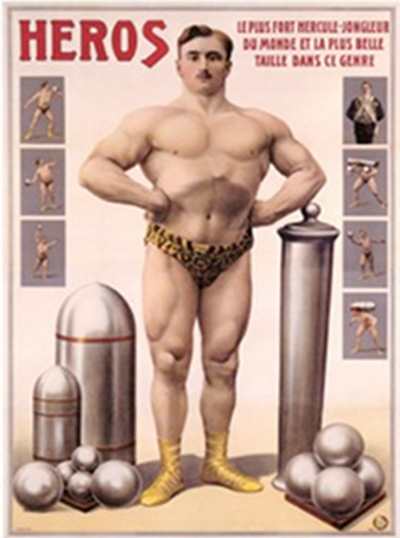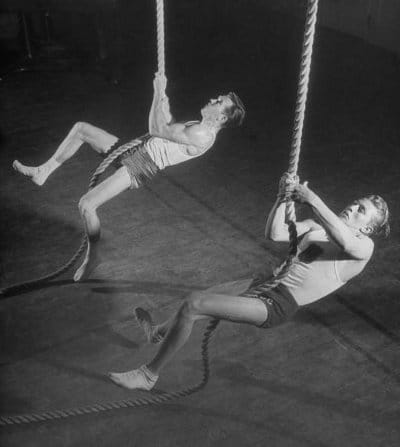
Editor’s note: This is a guest post from Joe Hashey, CSCS.
In a previous article, Odd Object Training Primer, I mentioned that people can work out with just a length of thick rope. Rope training is nothing new but has been gaining popularity over the last few years. We have been using thick ropes for nearly two years with great benefits. If you had a bad experience with climbing the rope in middle school, maybe it’s time to revisit this classic fitness tool.
Benefits of Thick Rope Training
During most thick rope exercises, the muscles in the hands and forearms are engaged to a great extent, which is an area where many men lack sufficient strength. At Synergy Athletics, we use ropes during the accessory portion of our workouts. That means we perform our regular primary exercises (typically compound barbell lifts) and then incorporate the ropes into the program.
In addition to stronger hands and forearms, ropes can be used for a variety of climbing and pulling exercises to increase relative body strength. These movements are both fun and effective for general physical preparedness, specifically in younger athletes.
Where to Get Thick Rope
Unfortunately you won’t be able to run down to Home Depot and pick up the rope that I am talking about. Their rope is just too light and small in diameter. Depending on your abilities, you will want to purchase a rope that is between 1 ¼ to 3 inches in diameter and 40 to 60 feet in length. We have ropes that range from 1 ¼ in to 4 inch in diameter, but I personally prefer 2 inch rope. The 4 inch rarely makes it off the shelf.
Many websites sell thick rope; however, the most inexpensive ones I have come across are on Ebay and McMaster Carr. Just search for what you want on those sites, and it will save you money.
Four Effective Thick Rope Exercises
1. Supine Rows. Throw the rope over a fixed object. In the gym we use a power rack, at home a tree branch. Lie down on your back, reach up and grab the row, then pull your hands to your chest. The advanced variation involves elevating your feet.
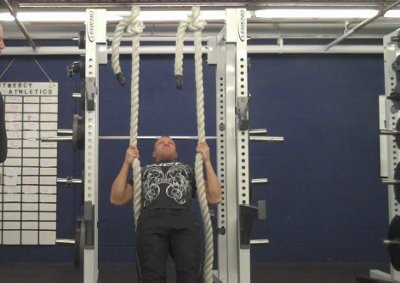
2. Pull-Ups. Just throw the rope over a fixed object like with the supine row set up. Reach up, grab a hold and begin your pull-ups. You will be able to do far fewer with the rope than on a regular bar because of the added grip strength required. Do these FIRST then finish with regular pull-ups so you still train your back muscles, and your grip isn’t the weak link.
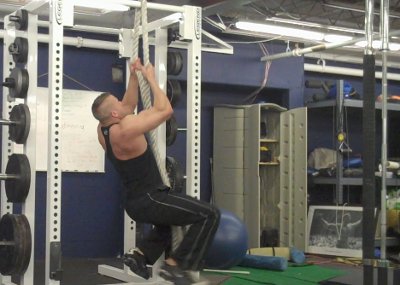
3. Hand Over Hand Rows. Attach the rope to a weighted object (outdoors). This object is usually a sled, but you could use anything that is heavy. Walk the rope out to the end then row the object all the way to you. Repeat for multiple sets.
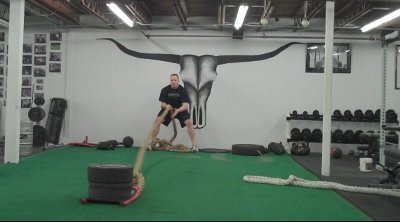
4. Rope Battling. Up until this point, all the exercises have been pulling movements. Rope battling is for conditioning. Anchor your rope around a fixed object so the rope folds in half and you have both ends in your hands.
The easy instructions – whip it around for time.

Details – make waves in the rope. You can make big waves, small waves, or alternating waves. Then take both and try to make circles in the rope (grappler tosses). Complete this for a timed set.
Sample rope battling workout – apply the Tabata protocol to your movements. With high intensity, whip the rope around for 20 seconds and then rest for 10 seconds. Repeat for 8 consecutive sets of 20 on and 10 off.
These are just a few ways you can benefit from using ropes. Check out this rope training video with a few more ideas!
Pick up a length of rope and start incorporating it into your training ASAP!
________________________________________________
Joe Hashey is a Certified Strength and Conditioning Specialist through the NSCA.
Tags: Exercises

